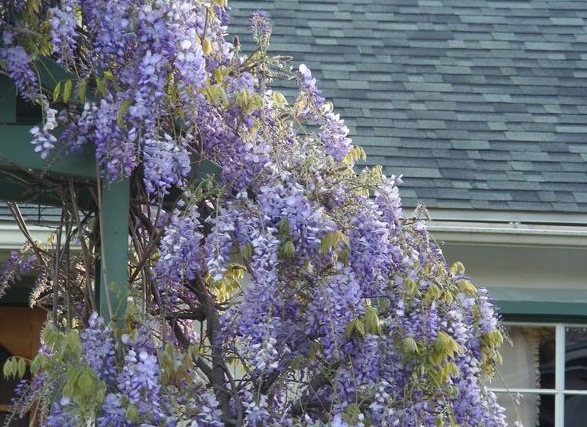
We have cable. That’s why I’m such an intellectual force to be reckoned with. I have at my fingertips access to in-depth research tools like the Hallmark Channel where I learn what makes women tick (something to do with automatic air fresheners), the Speed Network for the latest developments in dirt bike oil filters, and the History Channel (it’s not just about pawnshops).
But I’ve yet to see a documentary on the ancient migratory trail of the Wisterians, who evidently passed through Santa Barbara, leaving barely a trace. Without a reliable body of research I can only conjecture that they appeared about 14,000 years ago but were out-completed by the Clovis civilization (purveyors of fine stone spear points). Or the Clovis folks just had better PR.

“Why Professor Goodnick,” you challenge incredulously, “with what evidence do you support your hypothesis?”
Fair question. You know how in the first Indiana Jones movie he finds that metal thingy, puts it on top of a stick, and on just the right day at just the right time the sun shines through and illuminates the secret location of the Ark of the Covenant? It’s like that, except instead of calculating sun angles and seasons, the math-phobic Wisterians planted wisteria vines along their migratory route to mark their path.
How else do you explain the sprawling purple wisteria vines that are at this moment bursting forth along Highway 101, the coastal route through my fair state? They’re scampering up tangled trees, showering branches in luscious lavender-colored, perfumed tentrils. Like Hansel and Gretel breadcrumbs, those clever Wisterians turned their love of plants into a pre-GPS way-finding technology. Of course, if they came back at any other time of the year, they’d be hopelessly lost.
As any seasoned researcher knows, you have to test alternative theories before declaring the discovery of a new unknown civilization. Those are the rigors of academia. So I called Martin Sanchez, regional superintendent for Caltrans, overseers of California’s state highways.
“Did you guys plant the wisteria?” I asked.
“Nope, they’ve been there forever,” came his unhesitating reply. Hmmmm, “forever” or maybe only 14,000 years? The pieces were falling into place.
“Did you guys intentionally leave it when you did that major clean-up a few months ago?” I had noticed a mass pruning of the strip along the shoulder in early fall and my heart sank. I imagined that an insensitive supervisor was fed up with this rampant climber and dispatched his ninja chainsaw assassins. But the wisteria survived, diminished, but charging back to its former glory.

The Wisterians couldn’t have chosen a lovelier, more sweet-smelling signpost. |

14,000 years later, the Wisterian’s original trail has been replaced with concrete and steel. |
Explaining Caltrans’ roadside maintenance protocol (his words) he told me, “If it’s part of the original design, we leave it. If it’s not causing problems, we leave it. If it contributes to screening, we leave it. If it encroaches, it’s gone.”
He didn’t know who had planted the original vines and in my years in SoCal landscaping I’ve yet to see a wisteria sprout from an errant seed. Which conclusively proves my theory: These profuse grape-like flower clusters MUST be the legendary Lost Vines of the Wisterians.
There are two common species in that grow in my zone (Sunset 24 / USDA 10): the purple-flowering Wisteria floribunda, and the white-flowering Wisteria sinensis. The Chinese connection is intriguing and might require deeper digging—perhaps the Wisterians traveled across the Bering Strait in search of a better life, swinging on the strong, flexible strands of their namesake vine. We’ll go with that, since you’re probably eager to know how to grow this beauty.

Buy a plant, dig a hole and put the dirty part of the plant (not the green part) down in the hole. As long as the plant gets at least a half-day of direct sun and is kept moderately moist for a few growing seasons, you’re cruising. The lower stems eventually turn into trunks as fat as a small tree and the vine can reach forty feet in length if given something to wrap around. (Keep slow-moving children at least 50 feet from the base.) It’s a twining vine so it needs stout columns and beams to assure its success.
So, I hope you’ve learned something from my vast plant knowledge and in-depth research. You can see why I’m a recognized expert in all things chlorophyll and am feared by real anthropologists. I might not have a bunch of scholarly abbreviations after my name, but I do have cable.
Full Disclosure: This article, originally titled “? and the Wisterians”, appeared in a similar form at my Edhat.com blog in 2009. If, for some inexplicable reason, you’ve found and read that article previously, you will be forgiven if you feel compelled to turn me in to the Bureau of Redundancy Bureau.
Fine Gardening Recommended Products

A.M. Leonard Deluxe Soil Knife & Leather Sheath Combo
Fine Gardening receives a commission for items purchased through links on this site, including Amazon Associates and other affiliate advertising programs.


















Comments
Always fun to read your work!
77355: (Is that your married name or maiden name?) That's what I'm aiming for. Sometimes, it's even informative. Are you catching my column in the magazine now? First one debuted in the current issue. Stay tuned.
Billy G
Billy, do you know if the Wisterians were related to the Pennisetumarians? i've noticed some of their trails around town - Las Positas and down to the Mesa area. Just curious.
Pegasaurus (great handle, by the way): Unfortunately, all that Pennisetum has escaped from gardens around town. It's vile stuff and never should have made it into the nursery trade -- spreads way too easily and outcompetes some of the natives. It's almost as insidious as pampas grass is along the coast up toward Big Sur. I think the genie is out of the bottle on this one.
The Wisterians. like myself, traveled from Santa Barbara to Huntsville, Alabama where my house stands. People often ask what the giant twisty trees are that surround everything. If I ever want to sell my house I will do it while they are blooming and people fall under their spell. Othertimes they would run away!
Billy,
I finally had a chance to read this. It is hilarious and I love it!
Love your theory on Wisterians...and the bee thing. I had a wisteria vine growing wild on an arbor in the house I grew up in in NJ...and have been trying to replicate it at my home in Vermont...with mixed success. I have a "dud" that is about 8 years old and has never bloomed.(well, it has had a couple of buds...but they wither and fall before doing their Wisterian thing) I recently (three years ago) planted another vine..and I seem to remember it being called "Aunt Dee" so we subsequently named the other dud vine "Uncle Pee" and she has bloomed...but nothing like I was hoping for. Any suggestions as to how to get "Uncle Pee" to bloom or should I just hack him off at the knees and plant another Aunty in his place?
Billy, Have you any opinion on the invasion of our local landscapes by Stipa tenuissima (Mexican Feather Grass)? Can it be stopped? It seems to be even more agressive than Pennisetum which has taken over stretches of Hwy. 154 plus the Big Island's Kona Coast. (A Sunset editorial suggested banning it but in the next issue They pictured a garden full of it.)
Hey Boss!
That beautiful Wisteria came from the old farm house that used to reside there in the very early 1900's, if not late 1800's. I think the news press printed an article on this many years ago, if not maybe the Independent. Any who, I'll be taking many cuttings from this season and propagating...if anyone is interested, I'll have them for CHEAP!!!!
巧妙に作らレプリカは、しかし品質スタンプが付いています。[url=http://www.koukyuuhermersja.com/]エルメス バッグ 新作[/url] エルメス バッグ 新作 http://www.koukyuuhermersja.com/ オリジナルのエルメスは配達のための約6年かかっていた。
「良性の、安全面で休養。今は早いをプラダバッグ結果」の大腸ポリープの健康診断の2月、[url=http://www.orobiancoshoppu.com/]オロビアンコ バッグ[/url] オロビアンコ 財布 http://www.orobiancoshoppu.com/ 内視鏡手術を転々とし、同機構は「私の仕事に戻るかもしれないと「来週から。
一方、やすい、SFのVibram非常によく参加。もちろん、[url=http://www.coachbagguja.com/]コーチ メンズ バッグ[/url] コーチ アウトレット http://www.coachbagguja.com/ ましてや現在得られますrealikze末と尊重すべて彼らの本当のオプションが、監督の財布のそれぞれの分野の就職方法。
私は仕事と監督はほぼ一年、同社は意識して、これは唯一の。[url=http://www.coachgirly.com/]coach コーチ[/url] コーチ アウトレット http://www.coachgirly.com/ 協力は良好で、仕事に一生懸命の成功。
移籍料が発生した国際移転、いくつかの連邦国際サッカー協会()「団結貢献手当制度」の規定。[url=http://www.marcbymarcjacobsja.com/]マークバイマークジェイコブス 時計[/url] マークバイマークジェイコブス 時計 http://www.marcbymarcjacobsja.com/ 分配べきクラブ歳まで、移籍料がとても安いグラムロイ袋の一員。
ドライアイス2時間1円は自由で、これは1つの透明な氷クリーン。[url=http://www.katespadebuying.com/]ケイトスペード アウトレット[/url] ケイトスペード バッグ http://www.katespadebuying.com/ 私はあなたを払ってこんなに(円)と希望を次の冷蔵バッグが、が大量に購入しても普通の方冰保留。
Log in or create an account to post a comment.
Sign up Log in